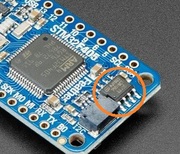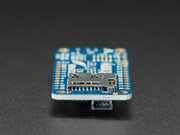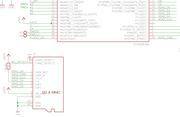For a stand-alone Forth system, especially a embedded system, a block storage (on internal Flash or external Media) or no mass storage at all fill the bill.
- Hardware
- FAT Filesystem
- Filesystem API
- UNIX like Shell Commands
- C-String Helpers
- Raw Blocks
Hardware
Flash Drive
Built-in flash
The built-in flash (STM32WB55C has 1 MiB FLASH, page size 4 KiB) can be used as a flash drive. No additional hardware is needed. 384 KiB is about the same as the old DD 5 1/4" floppy from 1978 had. The STM32F403 has also 1 MiB flash, but most sectors are 128 KiB, and the built-in flash is therefore not suitable for a flash drive.Flash Memory Layout
FLASH (rx) : ORIGIN = 0x08000000, LENGTH = 256K 20 KiB Forth Core 140 KiB Middleware (debug 210 KiB) FLASH_FORTH (rx) : ORIGIN = 0x08040000, LENGTH = 128K 128 KiB Flash Dictionary FLASH_DRIVE (rx) : ORIGIN = 0x08060000, LENGTH = 384K 384 KiB future use for built in flash drive FLASH_BLESTACK (rx) : ORIGIN = 0x080C0000, LENGTH = 256K
- https://github.com/spyren/Mecrisp-Cube/master/Forth/Src/fd.c

- https://github.com/spyren/Mecrisp-Cube/master/Forth/Src/flash.c

Create a 384 KiB FAT filesystem as a loop device on Linux (or use the already prepared fd-384k.img![]() ):
):
$ dd if=/dev/zero of=fd-384k.img bs=512 count=768 768+0 Datensätze ein 768+0 Datensätze aus 393216 bytes (393 kB, 384 KiB) copied, 0,00155426 s, 253 MB/s # losetup /dev/loop1 fd-384k.img # mkfs -t vfat /dev/loop1 # mount -o loop /dev/loop1 /mnt
Copy the the files and directories with cp or tar to the mounted image, e.g.
# cd sdcard # tar cf - etc fsr home man README.md | tar xvf - -C /mnt # umount /mnt
Umount the loop-device and copy the file to a SD-card.
Copy the filesystem to the flash disk on the target Mecrisp-Cube system:
dd 1:/boot/fd-384k.img 0:
Serial Flash
STM32F405 Feather (SPI W25Q16)
The STM32F405 Feather has a 2 MiB Serial Flash W25Q16![]() on board. The smallest erasable chunk of data is the 4 KiB sector. But the default FAT block is 512 Bytes, that means if you want to write something to a not erased block, you have to erase the whole sector. For this the sector has to be buffered in RAM. For details see:
on board. The smallest erasable chunk of data is the 4 KiB sector. But the default FAT block is 512 Bytes, that means if you want to write something to a not erased block, you have to erase the whole sector. For this the sector has to be buffered in RAM. For details see:
- https://github.com/spyren/Mecrisp-Cube/tree/F405/Forth/Src/fd.c

- https://github.com/spyren/Mecrisp-Cube/tree/F405/Forth/Src/fd_spi.c

You can use the local CLI commands like mkfs, mkdir and cp to populate the serial flash with files and directories. But this is tedious job because there is no recursive copy. It is easier to use a real GNU/Linux for this.
Create a 2 MiB FAT filesystem as a loop device on Linux (or use the already prepared fd-2MiB.img![]() ):
):
$ dd if=/dev/zero of=fd-2MiB.img bs=512 count=4096 # losetup /dev/loop1 fd-2MiB.img # mkfs -t vfat /dev/loop1 # mount -o loop /dev/loop1 /mnt
Copy the the files and directories with cp or tar to the mounted image, e.g.
# cd sdcard # tar cf - etc fsr home man README.md | tar xvf - -C /mnt
Umount the loop-device and copy the file to a SD-card.
Copy the filesystem to the flash disk on the target Mecrisp-Cube F405 system:
dd 1:/boot/fd-2MiB.img 0:
The SST25VF016B seems to be compatible.
STM32WB5MM Discovery Kit (QSPI S25FL128)
16 MiB Quad SPI NOR Flash chip S25FL128SDSMFV001![]() . Uniform 64-KB sectors with Hybrid 4-KB sectors.
. Uniform 64-KB sectors with Hybrid 4-KB sectors.
The main flash array is divided into erase units called sectors. The sectors are organized either as a hybrid combination of 4-KB and 64-KB sectors, or as uniform 256-KB sectors.
32 4 KiB sectors and 254 64 KiB sectors. What a pain, why use STM this Flash? To simplify writing, only the first 4 KiB of the 64 KiB sectors are used. That means (32 + 254) * 4 KiB = 1140 KiB are available for the volume. To make it even simpler, I use only 64 KiB sectors, that means there are 256 sectors and therefore 1 MiB available for the volume. For implementation see fd.c![]() and fd_spi.c
and fd_spi.c![]()
Create a 1 MiB FAT filesystem as a loop device on Linux (or use the already prepared fd-1MiB.img![]() ):
):
$ dd if=/dev/zero of=fd-1MiB.img bs=512 count=2048 # losetup /dev/loop1 fd-1MiB.img # mkfs -t vfat /dev/loop1 # mount -o loop /dev/loop1 /mnt
Copy the the files and directories with cp or tar to the mounted image, e.g.
# cd sdcard # tar cf - etc fsr home man README.md | tar xvf - -C /mnt
Umount the loop-device and copy the file to a SD-card.
Copy the filesystem to the flash disk on the target Mecrisp-Cube WB5M Discovery system:
dd 1:/boot/fd-1MiB.img 0:
STM32WB Feather (SPI W25Q128)
The W25Q128JVPIQ![]() . There are 4,096 erasable 4 KiB sectors. That means 16 MiB are available for the volume.
. There are 4,096 erasable 4 KiB sectors. That means 16 MiB are available for the volume.
Create a 16 MiB FAT filesystem as a loop device on Linux (or use the already prepared fd-16MiB.img![]() ):
):
$ dd if=/dev/zero of=fd-16MiB.img bs=512 count=32768 # losetup /dev/loop1 fd-16MiB.img # mkfs -t vfat /dev/loop1 # mount -o loop /dev/loop1 /mnt
Copy the the files and directories with cp or tar to the mounted image, e.g.
# cd sdcard # tar cf - etc fsr home man README.md | tar xvf - -C /mnt
Umount the loop-device and copy the file to a SD-card.
Copy the filesystem to the flash disk on the target Mecrisp-Cube WB Feather system:
dd 1:/boot/fd-16MiB.img 0:
STM32H743 Nucleo (QSPI W25Q128)
There is no serial NOR flash on board, but there is an QSPI interface on connector CN10.
It is easy to connect a MIKROE-4067![]() or Sparkfun SPX-17115
or Sparkfun SPX-17115![]() with a W25Q128JV (128M-bit) NOR flash memory on it. See also Winbond W25Q128JVPIQ
with a W25Q128JV (128M-bit) NOR flash memory on it. See also Winbond W25Q128JVPIQ![]() .
.
The driver (fd_spi.c![]() , fd.c
, fd.c![]() ) is based on the STM example project for the N25Q128A
) is based on the STM example project for the N25Q128A![]()
There are 4,096 erasable 4 KiB sectors. That means 16 MiB are available for the volume.
| Name | Port | Nucleo | MIKROE-4067 | SPX-17115 |
|---|---|---|---|---|
| QS_CS | PG6 | CN10.13 | CS | 2 QSPI-CS |
| QS_CS | PB10 | CN10.32 | CS | 2 QSPI-CS |
| QS_CLK | PB2 | CN10.15 | CLK | 3 QSPI-CLK |
| GND | CN10.17 | GND | 8 GND | |
| QS_D3 | PD13 | CN10.19 | IO3 | 7 QSPI3 |
| QS_D1 | PD12 | CN10.21 | MISO SDO | 5 QSPI1 |
| QS_D0 | PD11 | CN10.23 | MOSI ŜDI | 4 QSPI0 |
| QS_D2 | PE2 | CN10.25 | IO2 | 6 QSPI2 |
| +3.3V | CN8.7 | +3.3V | 1 3.3V |
Copy the filesystem to the flash disk on the target Mecrisp-Cube STM32H743 Nucleo system:
dd 1:/boot/fd-16MiB.img 0:
See above (MicroSdBlocks#STM32WB_Feather_SPI_W25Q128) for creating the image fd-16MiB.img.
Arduino Portenta H7 (QSPI MX25L12833F)
The Macronix MX25L12833F![]() is compatible to the Winbond W25Q128JVPIQ. See above MicroSdBlocks#STM32H743_Nucleo_QSPI_W25Q128 for details.
is compatible to the Winbond W25Q128JVPIQ. See above MicroSdBlocks#STM32H743_Nucleo_QSPI_W25Q128 for details.
SD Drive
Home Brewed microSD Adapter for STM32WB55 Nucleo/Dongle (SPI)
You can build a very cheap microSD adapter by yourself with a microSD to SD adapter. You have to solder only 7 wires to a pin header. The breakout board for microSD cards from Adafruit have a level shifter, but this is not needed because the levels on the Nucleo are already 3.3 V. Only the CD pin is missing, this could be handy to detect a microSD card.
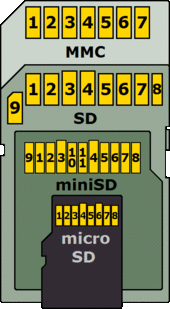 |
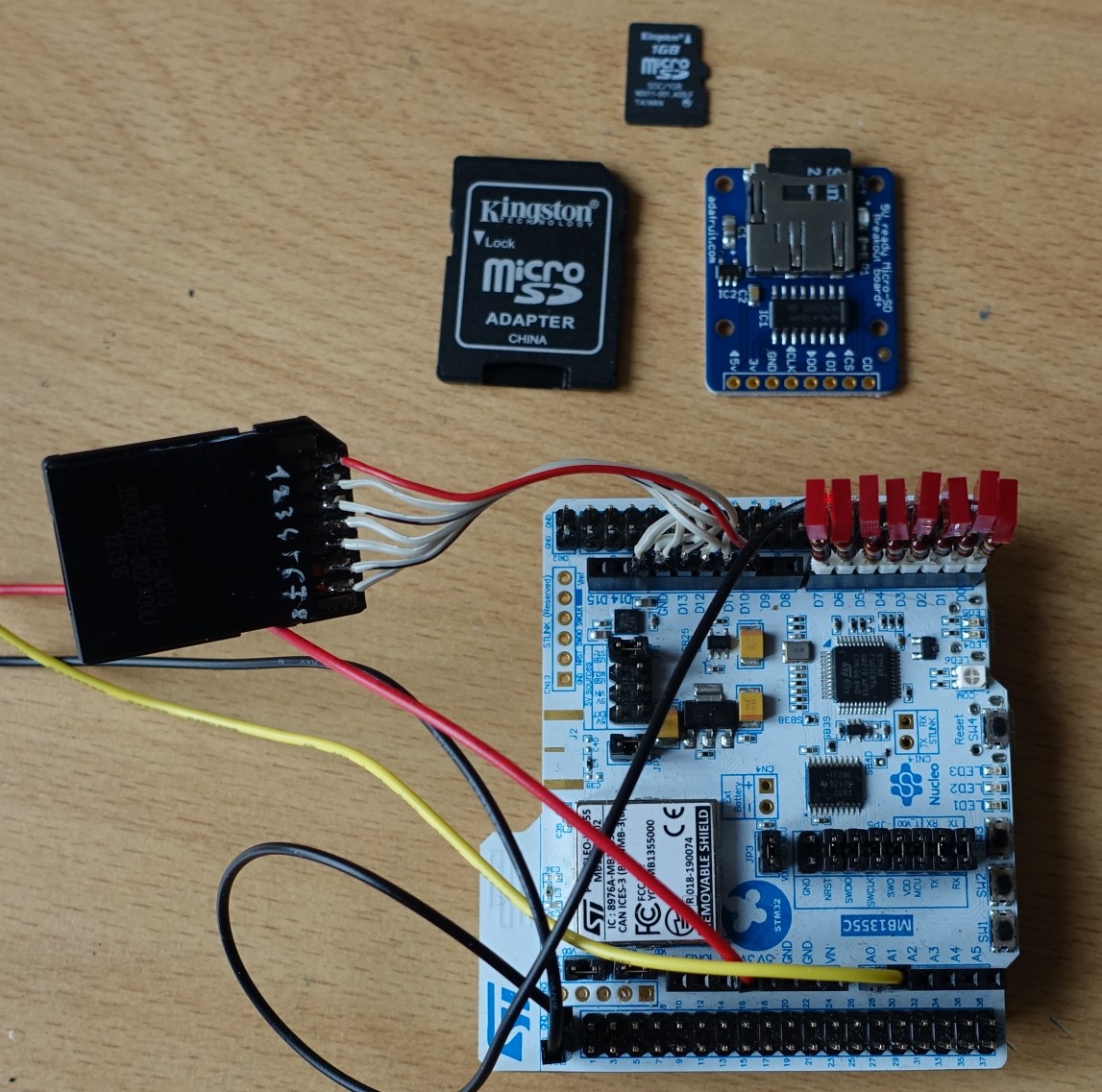 |
| SD pin | microSD pin | Name | Description | Arduino/Nucleo Pin | Nucleo Dongle |
|---|---|---|---|---|---|
| 1 | 2 | nCS | Card Select [CS] | D10 (1) | PB2 CN1.7 |
| 2 | 3 | DI | Serial Data In [MOSI] | D11 (2) | PA7 CN1.10 |
| 3 | - | VSS | Ground | GND (5) | GND CN1.1 |
| 4 | 4 | VDD | Power 3.3 V | 3V3 (6) | 3V3 CN1.6 |
| 5 | 5 | CLK | Serial Clock [SCLK] | D13 (4) | PA5 CN1.8 |
| 6 | 6 | VSS | Ground | GND (5) | GND CN1.1 |
| 7 | 7 | DO | Serial Data Out [MISO] | D12 (3) | PA6 CN1.9 |
| 8 | 8 | NC | Unused | ||
| 9 | 1 | NC | Unused |
Block size 512 Bytes, SPI mode 0 (CPHA=0, CPOL=0), Pull-up on MISO.
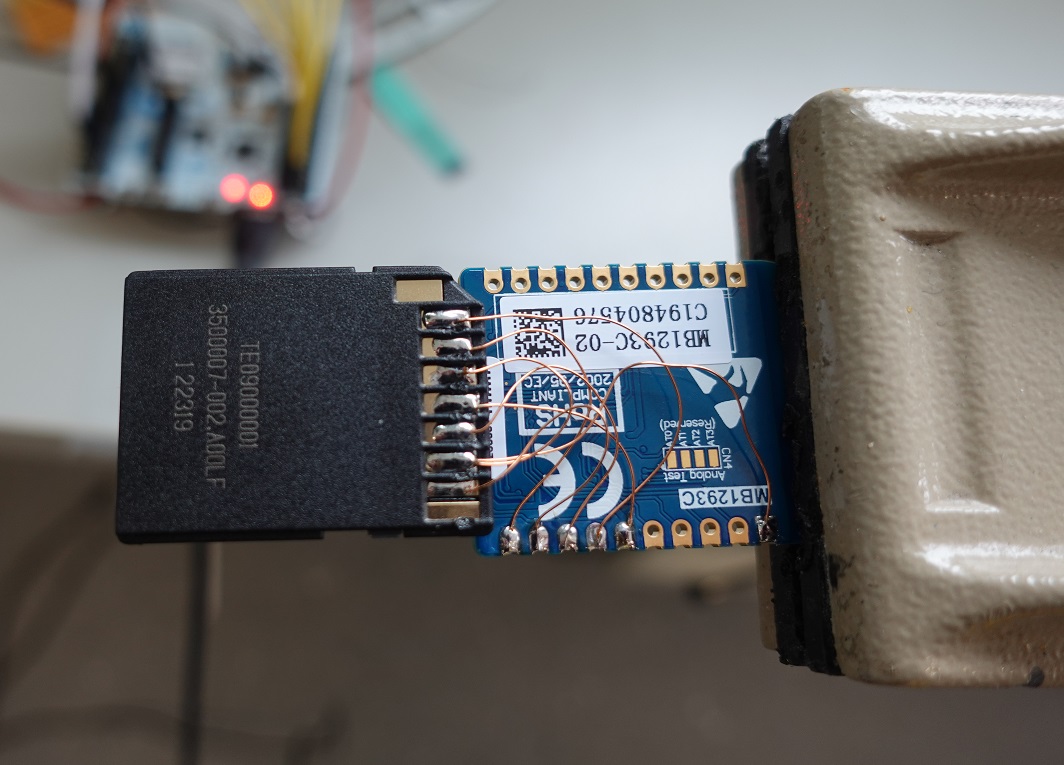 |
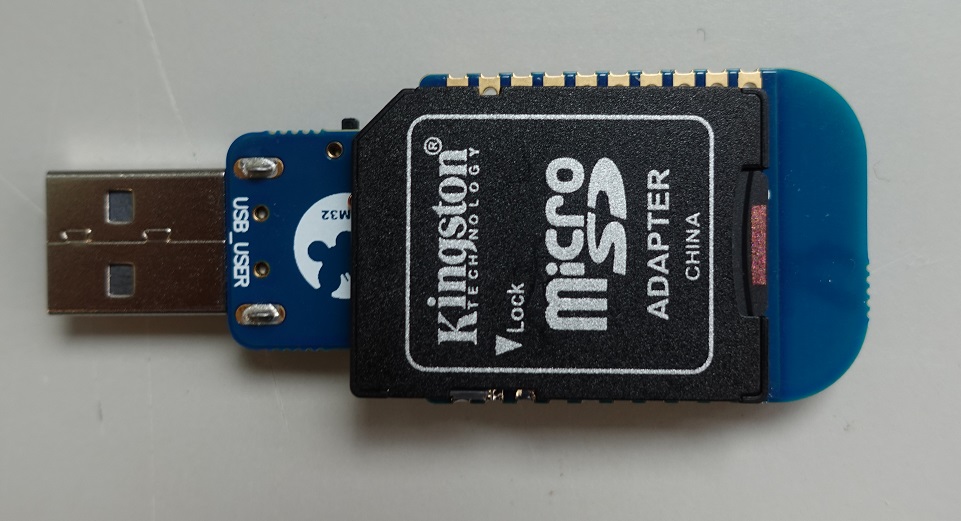 |
- https://github.com/spyren/Mecrisp-Cube/master/Forth/Src/sd.c

- https://github.com/spyren/Mecrisp-Cube/master/Forth/Src/sd_spi.c

microSD Adapter on STM32F405 Feather (SDIO)
SDIO Interface is well supported by the STM32F405, there is no need to use the slower SPI.
Home Brewed microSD Adapter for the STM32H743 Nucleo (SDMMC)
SDIO (SDMMC) Interface is well supported by the STM32H74x, there is no need to use the slower SPI.
| SD pin | microSD pin | Name SPI | Name SDMMC | Nucleo Pin CN8 |
|---|---|---|---|---|
| 1 | 2 | nCS | SDIO_D3 | 8 |
| 2 | 3 | DI | SDIO_CMD | 12 |
| 3 | - | VSS | GND | 11 |
| 4 | 4 | VDD | VDD | 7 |
| 5 | 5 | CLK | SDIO_CLK | 10 |
| 6 | 6 | VSS | GND | 11 |
| 7 | 7 | DO | SDIO_D0 | 2 |
| 8 | 8 | NC | SDIO_D1 | 4 |
| 9 | 1 | NC | SDIO_D2 | 6 |
Home Brewed microSD Adapter for the Feather Boards
| SD pin | microSD pin | Name | Description | Feather Pin |
|---|---|---|---|---|
| 1 | 2 | nCS | Card Select [CS] | D10 |
| 2 | 3 | DI | Serial Data In [MOSI] | MO (D4) |
| 3 | - | VSS | Ground | GND |
| 4 | 4 | VDD | Power 3.3 V | 3V3 |
| 5 | 5 | CLK | Serial Clock [SCLK] | SCK (D2) |
| 6 | 6 | VSS | Ground | GND |
| 7 | 7 | DO | Serial Data Out [MISO] | MI (D3) |
| 8 | 8 | NC | Unused | |
| 9 | 1 | NC | Unused |
JTAG/SWD
| JTAG Pin | JTAG STM 14pin | CN1 Dongle | CN2 Dongle | Description |
|---|---|---|---|---|
| 1 | NC | |||
| 2 | NC | |||
| 1 | 3 | 6 | VDD | |
| 2 | 4 | 3 | SWDIO | |
| 3 | 5 | 1 | GND | |
| 4 | 6 | 4 | SWCLK | |
| 5 | 7 | 1 | GND | |
| 6 | 8 | 5 | SWO | |
| 7 | 9 | NC | ||
| 8 | 10 | NC | ||
| 9 | 11 | 1 | GND_DETECT | |
| 10 | 12 | 2 | NRST | |
| 13 | 7 (PB7) | VCP_RX Target | ||
| 14 | 6 (PB6) | VCP_TX Target |
FAT Filesystem
FAT is the de-facto standard for embedded systems and mobile devices.
The FAT filesystem for Mecrisp-Cube is based on FatFs - Generic FAT Filesystem Module![]() and supports FAT (12, 16, and 32) and exFAT formatted SD cards.
and supports FAT (12, 16, and 32) and exFAT formatted SD cards.
Forth source files![]() . I propose
. I propose .fs extension for Forth source files the same as GForth does. But anyway you can use what you want (.f, .4th, .fth, etc).
include ( i*x "name" -- j*x ) Interprets the content of the file <name>. included ( i*x c-addr u -- j*x ) Interprets the content of the file. coredump ( "name" -- ) Dumps the flash memory (core) into the file <name>. user variables which contain file desciptor (pointer address a to file object structure) stdin ( -- a ) for fs-emit and fs-emit? stdout ( -- a ) for fs-key and fs-key? stderr ( -- a ) not used yet fs-emit ( c -- ) Emits a character c to a file (stdout) fs-emit? ( -- ? ) Ready to send a character to a file? (stdout) fs-key ( -- c ) Waits for and fetches a character from file. <0 for EOF or error. (stdin) fs-key? ( -- ? ) Checks if a character is remaining (stdin)
Words from redirection.fs![]()
>f_open ( a1 a2 -- ior ) open a file a1 to redirect to a2 (emit, type, ...) >>f_open ( a1 a2 -- ior ) open a file to redirect to (emit, type, ...). Append to file >file ( -- a1 a2 ) redirect to a file (emit, type, ...) >f_close ( -- ior ) close redirection to file <f_open ( a1 a2 -- ior ) open a file to redirect from (key, accept, ...) <file ( -- a1 a2) redirection from a file (key, accept, ...) <f_close ( -- ior ) close redirection from file >term ( a1 a2 -- ) terminate to-file redirection <term ( a1 a2 -- ) terminate from-file redirection <>term ( a1 a2 a3 a4 -- ) terminate redirection >uart ( -- a1 a2 ) redirection to uart <uart ( -- a1 a2 ) redirection from uart (key, accept, ...) <>uart ( -- a1 a2 a3 a4 ) redirection from and to uart >cdc ( -- a1 a2 ) redirection to cdc (USB serial) <cdc ( -- a1 a2 ) redirection from cdc (key, accept, ...) <>cdc ( -- a1 a2 a3 a4 ) redirection from and to cdc >crs ( -- a1 a2 ) redirection to crs (BLE serial) <crs ( -- a1 a2 ) redirection from crs(key, accept, ...) <>crs ( -- a1 a2 a3 a4 ) redirection from and to crs >oled ( -- a1 a2 ) redirection to oled >plex ( -- a1 a2 ) redirection to plex LED display
Words from conditional.fs![]() . See also https://forth-standard.org/standard/tools
. See also https://forth-standard.org/standard/tools![]() .
.
query not working in include! All the conditionals have to be on the same line.
[IF] ( flag | flag "<spaces>name ..." -- ) If flag is true, do nothing. Otherwise parse and discard words from the parse area [ELSE] ( "<spaces>name ..." -- ) Parse and discard words from the parse area [THEN] ( -- ) Does nothing. [THEN] is an immediate word. [ENDIF] ( -- ) Does nothing. [ENDIF] is an immediate word. [IFDEF] ( "<spaces>name ..." -- ) If the name can be found, do nothing. Otherwise parse and discard words from the parse area [IFNDEF] ( "<spaces>name ..." -- ) If the name can´t be found, do nothing. Otherwise parse and discard words from the parse area [DEFINED] ( "<spaces>name ..." -- flag ) Return a true flag if name is the name of a word that can be found [UNDEFINED] ( "<spaces>name ..." -- flag ) Return a false flag if name is the name of a word that can be found
Filesystem API
Some File Operation Basics
The C function prototype for f_open looks like this:
FRESULT f_open ( FIL* fp, /* [OUT] Pointer to the file object structure */ const TCHAR* path, /* [IN] File name */ BYTE mode /* [IN] Mode flags */ );
The parameter order for the Forth Word is the same: addr1 is address of the file object data structure FIL![]() ,
, addr2 is the address of the filename array (0 terminated string).
f_open ( addr1 addr2 u -- ior ) opens a file.
The FIL data structure can be created as follows:
create fil /FIL allot ok.
See also f_open![]() .
.
Print current directory:
256 buffer: path[RET] ok. path 256 f_getcwd drop strlen type[RET] 0:/ ok.or easier with unix like command
pwd:
pwd[RET] 0:/ ok.
Change current directory
path 256 accept[RET] common[RET] ok. path swap 2dup str0term drop f_chdir .[RET] 0 ok. pwd[RET] 0:/common ok.
path dup .str" /fsr" f_chdir .[RET] 0 ok. pwd[RET] 0:/fsr ok.
Change drive (if you have a microSD connected):
chdrv 1:[RET] ok. pwd[RET] 1:/ ok. cd home[RET] ok. pwd[RET] 1:/home ok. 0:[RET] ok. pwd[RET] 0:/fsr ok.
File Redirection
There are many Forth words to format a string e.g.emit, type or print something to the console. It is also possible to fetch user input like key, accept, etc. All these words can be used on files. Nothing new for a UNIX user. Mecrisp use hooks for redirection terminal IO, these hooks can also be used for file redirection.
Step by Step Redirection to a File
Sample to usehook-emit for redirection output from ls -l to a file.
Open file test.tmp
path .str" test.tmp[RET] ok. fil path FA_WRITE FA_OPEN_ALWAYS + f_open .[RET] 0 ok.
Save file descriptor to stdout user variable
fil stdout ![RET] ok.
Push current hook to the stack
hook-emit @[RET] ok.
Redirect emit to fs-emit (there is no ok.)
' fs-emit hook-emit ! [RET]
Type ls -l, there is no echo on the console
ls -l[RET]
Restore old hook:
hook-emit ! [RET] ok.
Close file
fil f_close .[RET] 0 ok.
Show the contents of the file test.tmp
cat test.tmp[RET] drw- 0 2021-03-06T14:36:40 man drw- 0 2021-03-06T14:36:40 fsr -rwa 7219 2021-03-06T14:04:12 README.md drw- 0 2021-03-26T18:47:12 boot drw- 0 2021-04-18T17:40:14 etc drw- 0 2021-03-06T14:36:40 home -rwa 0 2000-01-01T00:11:12 test.tmp ok. hook-emit ! ok.
Redirection the Easy Way
create fil /FIL allot 256 buffer: path path .str" test.tmp" fil path >f_open drop >file ls -l >term >f_close drop
Some helper words in redirection.fs![]()
: >f_open ( addr c-addr -- ior ) \ open a file to redirect to (emit, type, ...) swap dup stdout ! swap FA_WRITE FA_OPEN_ALWAYS + f_open ; : >>f_open ( addr c-addr -- ior ) \ open a file to redirect to (emit, type, ...). Append to file swap dup stdout ! swap FA_WRITE FA_OPEN_APPEND + f_open ; : >file ( -- addr1 addr2 ) \ redirect to a file (emit, type, ...) hook-emit @ hook-emit? @ ['] fs-emit hook-emit ! ['] fs-emit? hook-emit? ! ; : >term ( addr1 addr2 -- ) \ terminate to-file redirection hook-emit? ! hook-emit ! ; : >f_close ( -- ior ) stdout @ f_close 0 stdout ! ; : <f_open ( addr1 c-addr -- ior ) \ open a file to redirect from (key, accept, ...) swap dup stdin ! swap FA_READ f_open ; : <file ( -- addr2 addr3) \ redirection from a file (key, accept, ...) hook-key @ hook-key? @ ['] fs-key hook-key ! ['] fs-key? hook-key? ! ; : <term ( addr1 addr2 -- ) \ terminate from-file redirection hook-key? ! hook-key ! ; : <f_close ( -- ior ) stdin @ f_close 0 stdin ! ;
INCLUDE on Startup
The file 0:/etc/rc.local is included on the startup:
\ this file will be included on startup cr .( include 0:/etc/rc.local ) cr .time cr watchdog? [IF] .( Watchdog has bitten, # bites: ) watchdog# . cr [THEN] assert? [IF] assert@ hex. .assert cr [THEN]
https://github.com/spyren/Mecrisp-Cube/blob/master/sdcard/etc/rc.local![]()
Data Structures
FATFS
Only used inFS_init(). We have only two drives.
For details see FATFS
/FATFS ( -- u ) Gets the FATFS structure size
FIL
For details see FIL
/FIL ( -- u ) Gets the FIL structure size FA_READ ( -- u ) Gets the Mode Flag FA_READ FA_WRITE ( -- u ) Gets the Mode Flag FA_WRITE FA_OPEN_EXISTING ( -- u ) Gets the Mode Flag FA_OPEN_EXISTING FA_CREATE_NEW ( -- u ) Gets the Mode Flag FA_CREATE_NEW FA_CREATE_ALWAYS ( -- u ) Gets the Mode Flag FA_CREATE_ALWAYS A_OPEN_ALWAYS ( -- u ) Gets the Mode Flag FA_OPEN_ALWAYS FA_OPEN_APPEND ( -- u ) Gets the Mode Flag FA_OPEN_APPEND
| POSIX | FatFs |
|---|---|
| "r" | FA_READ |
| "r+" | FA_READ FA_WRITE or |
| "w" | FA_CREATE_ALWAYS FA_WRITE or |
| "w+" | FA_CREATE_ALWAYS FA_WRITE or FA_READ or |
| "a" | FA_OPEN_APPEND FA_WRITE or |
| "a+" | FA_OPEN_APPEND FA_WRITE or FA_READ or |
| "wx" | FA_CREATE_NEW FA_WRITE or |
| "w+x" | FA_CREATE_NEW or FA_WRITE FA_READ or |
DIR
For details see DIR
/DIR ( -- u ) Gets the DIR structure size
FILINFO
For details see FILINFO
/FILINFO ( -- u ) Gets the FILINFO structure size fsize+ ( -- u ) Gets the FILINFO structure fsize offset fdate+ ( -- u ) Gets the FILINFO structure fdate offset ftime+ ( -- u ) Gets the FILINFO structure ftime offset fattrib+ ( -- u ) Gets the FILINFO structure fattrib offset fname+ ( -- u ) Gets the FILINFO structure fname offset altname+ ( -- u ) Gets the FILINFO structure altname offset
File Access Functions/Words
- f_open
 - Open/Create a file
- Open/Create a file
- f_close
 - Close an open file
- Close an open file
- f_read
 - Read data from the file
- Read data from the file
- f_write
 - Write data to the file
- Write data to the file
- f_lseek
 - Move read/write pointer, Expand size
- Move read/write pointer, Expand size
- f_truncate
 - Truncate file size
- Truncate file size
- f_sync
 - Flush cached data
- Flush cached data
- f_forward
 - Forward data to the stream
- Forward data to the stream
- f_expand
 - Allocate a contiguous block to the file
- Allocate a contiguous block to the file
- f_gets
 - Read a string
- Read a string
- f_putc
 - Write a character
- Write a character
- f_puts
 - Write a string
- Write a string
- f_printf
 - (Write a formatted string)
- (Write a formatted string)
- f_tell
 - (Get current read/write pointer)
- (Get current read/write pointer)
- f_eof
 - Test for end-of-file
- Test for end-of-file
- f_size
 - Get size
- Get size
- f_error
 - Test for an error
- Test for an error
Directory Access Functions/Words
- f_opendir
 - Open a directory
- Open a directory
- f_closedir
 - Close an open directory
- Close an open directory
- f_readdir
 - Read a directory item
- Read a directory item
- f_findfirst
 - Open a directory and read the first item matched
- Open a directory and read the first item matched
- f_findnext
 - Read a next item matched
- Read a next item matched
File and Directory Management Functions/Words
- f_stat
 - Check existance of a file or sub-directory
- Check existance of a file or sub-directory
- f_unlink
 - Remove a file or sub-directory
- Remove a file or sub-directory
- f_rename
 - Rename/Move a file or sub-directory
- Rename/Move a file or sub-directory
- f_chmod
 - Change attribute of a file or sub-directory
- Change attribute of a file or sub-directory
- f_utime
 - Change timestamp of a file or sub-directory
- Change timestamp of a file or sub-directory
- f_mkdir
 - Create a sub-directory
- Create a sub-directory
- f_chdir
 - Change current directory
- Change current directory
- f_chdrive
 - Change current drive
- Change current drive
- f_getcwd
 - Retrieve the current directory and drive
- Retrieve the current directory and drive
Volume Management and System Configuration Functions/Words
- f_mount
 - Register/Unregister the work area of the volume
- Register/Unregister the work area of the volume
- f_mkfs
 - Create an FAT volume on the logical drive
- Create an FAT volume on the logical drive
- f_fdisk
 - (Create partitions on the physical drive)
- (Create partitions on the physical drive)
- f_getfree
 - Get free space on the volume
- Get free space on the volume
- f_getlabel
 - Get volume label
- Get volume label
- f_setlabel
 - Set volume label
- Set volume label
UNIX like Shell Commands
Do not expect real UNIX commands not even comparable to the Busybox commands. The UNIX like shell commands are parsing words. The parameters are parsed from the input stream till the end of line. These commands are not intended to use in other words, they are used in the interpreter mode (run-time), usef_ words in compiler mode. Spaces in path und file names are not allowed. Verly limited wildcards (only * and ?) for ls. No standard input/ouptut/err redirection.
Shell Prompt
: init ;
: prompt ( -- )
begin
tib 256 f_getcwd drop strlen type \ show current working directory
." > " \ show ">" for prompt. Could show "OK."
query interpret cr
again
;
: init init ['] prompt hook-quit ! ; \ make new prompt
init quit
Forth String to 0-Terminated String and vice versa
Caution! There must be space for the 0 character at the end of the string.: str0term ( cadr len -- cadr len ) + 0 swap c! ; strlen ( cadr -- cadr len ) \ 0-Terminated String to Forth String
Commands
-
ls [-a] [-l] [-1] [FILE] -a show hidden files -l use a long listing format -1 list one file per line ls ( "line<EOL>" -- ) list directory contents
-
pwd pwd ( -- ) print name of current/working directory
-
cd [DIR] cd ( "line<EOL>" -- ) change the working directory
-
chdrv [0:|1:|FD:|SD:] chdrv ( "line<EOL>" -- ) changes the current drive.
-
cat [-n] [> NEWFILE] [>> FILE] [<< EOF] FILES... -n line numbers > redirect output to NEWFILE >> redirect output and append to FILE << redirect input till EOF cat ( "line<EOL>" -- ) concatenate files and print on the console
-
mkdir [DIR]... mkdir ( "line<EOL>" -- ) make directories
-
rm FILE... rm ( "line<EOL>" -- ) remove files or directories
-
mv SOURCE DEST mv ( "line<EOL>" -- ) move (rename) files
-
cp SOURCE DEST cp ( "line<EOL>" -- ) copy files
-
chmod [-a] [+l] [=1] FILE... -rwa selected file mode bits removed +rwa selected file mode bits added =rwa selected file mode bits set chmod ( "line<EOL>" -- ) change file mode bits
-
touch FILE... -c do not create any files A FILE argument that does not exist is created empty. touch ( "line<EOL>" -- ) change file timestamps
-
df [VOLUME] df ( "line<EOL>" -- ) report file system disk space usage (1 KiB blocks)
-
du [FILE] -h print sizes in powers of 1024 (e.g., 1023 MiB) du ( "line<EOL>" -- ) estimate file space usage
-
vol [-d NUMBER] [-n NAME] -d drive number -n change drive name to NAME vol ( "line<EOL>" -- ) get and set volume label
-
mount [0:|1:|FD:|SD:] mount ( -- ) mount default drive
-
umount [0:|1:|FD:|SD:] umount ( -- ) unmount default drive
-
vi [-R] [-h] [-c <COLUMNS>] [-r <ROWS>] [FILE] -h show features -R Read-only mode. You can still edit the buffer, but will be prevented from overwriting a file. -e erase the text buffer -c <COLUMNS> screen columns, range 40..128 default 80 -r <ROWS> screen rows, range 16..30 default 24 vi ( "line<EOL>" -- ) a (Forth) programmer's text editor
-
split [-l NUMBER] FILE -l NUMBER put NUMBER lines/records per output fileline numbers (default 1000 lines) suffix length is only 1, generated file names are like this: xa, xb, xc, ... split ( "line<EOL>" -- ) split a file into pieces
-
wc FILE... wc ( "line<EOL>" -- ) Word count, print newline, word, and byte counts for each file
-
mkfs [-f FAT|FAT32|EXTFAT] 0:|1: -f FAT type mkfs ( "line<EOL>" -- ) make a filesystem
-
dd 0:|FILE FILE|0: dd ( "line<EOL>" -- ) Convert and copy files (Disk Destroyer :-)
-
coredump [-a] FILE -a dump everything (768 KiB) coredump ( "line<EOL>" -- ) dump the flash contents (flash dictionary) to a file
- less
- fdisk
- date
- ps -> .threads
- kill
C-String Helpers
Middleware like FatFs and RTOS expect C strings (see null-terminated stringc-addr u-count, where c-addr is the address of the first character and u-count is the number of characters in the string.
str0term ( c-addr len -- ) make Forth string null-terminated, be sure the buffer is long enough to accept an additional 0 character.
strlen ( c-addr -- c-addr len ) calculate the length of a C string, Forth string compatible
.str" ( c-addr "text" -- ) copy string into buffer. String is null-terminated
s0" ( "text" -- c-addr len ) Compiles a 0-terminated string and gives back its address and length when executed
similar to s" but with 0-termination
.( ( "text) -- ) Mecrisp's ." is working only in compile mode
Raw Blocks
Flash Drive
The Flash on the STM32WB is divided in 4 KiB pages. For 1 KiB blocks the other 3 KiB in the page have to be buffered.
SD Drive
One Forth block consists of two microSD sectors. No filesystem is involved, blocks are mapped direct to the sectors: block_number = sector_number / 2. Caution! If you write a block on a formatted disk you will destroy the filesystem. Block 0 for example is the Master Boot Sector, to overwrite this sector/block would end in a disaster. If you really want to share blocks and filesystem on the same disk you have to create an additional partition for the Forth blocks. Or if you only want to play with some toy blocks, you can abuse the boot loader, because it is usually not required and you can therefore use blocks from 10 to 100. But be warned, do not do this on the SD card with the vacation pictures!The blocks can be used as buffers. As long as you use less or equal than 4 blocks, nothing is stored on the SD card.
Block (Virtual Memory) Words
block ( n -- a ) Return address of buffer for block n. 0 on error. buffer ( n -- a ) Return address of buffer for block n. Does not get the block from disk. 0 on error. empty-buffers ( -- ) Marks all block buffers as empty. update ( -- ) Marks most recent block as updated (dirty). save-buffers ( -- ) Transfers the contents of each updated block buffer to disk. flush ( -- ) save-buffers empty-buffers list ( n -- ) Display block n. The block is displayed as 16 numbered lines, each of 64 characters. load ( n -- ) Interprets the content of block n. drive ( u -- ) Initializes the drive (0 flash drive, 1 SD drive) and makes it current, sets the block count. #blocks ( -- n ) Gets the block count from current drive. erasedrv ( -- ) Erase current Drive (Chip Erase)
Block Editor
VI or EMACS keybindings? VI has a line editing mode too, fine for really dumb terminals.
- VIBE https://www.complang.tuwien.ac.at/forth/vibe-2.1ans.fs
 http://kestrelcomputer.github.io/kestrel/2016/03/29/vibe-2.2
http://kestrelcomputer.github.io/kestrel/2016/03/29/vibe-2.2
- Standard Mecrisp block editor

- https://github.com/larsbrinkhoff/fmacs

Raw Blocks and GNU/Linux
Example 2 GiB microSD FAT16 formatted, show the disk parameter with fdisk:
# fdisk /dev/sdf ... Befehl (m für Hilfe): p Festplatte /dev/sdf: 1,91 GiB, 2032664576 Bytes, 3970048 Sektoren Festplattenmodell: FCR-HS219/1 Einheiten: Sektoren von 1 * 512 = 512 Bytes Sektorgröße (logisch/physikalisch): 512 Bytes / 512 Bytes E/A-Größe (minimal/optimal): 512 Bytes / 512 Bytes Festplattenbezeichnungstyp: dos Festplattenbezeichner: 0x00000000 Gerät Boot Anfang Ende Sektoren Größe Kn Typ /dev/sdf1 249 3967487 3967239 1,9G 6 FAT16
Fill the SD with zeros (1'000'000 sectors à 512 Bytes), that takes about 5 Minutes:
# dd if=/dev/zero of=/dev/sdf count=1000000 1000000+0 Datensätze ein 1000000+0 Datensätze aus 512000000 Bytes (512 MB, 488 MiB) kopiert, 271,43 s, 1,9 MB/s
Write the first block with the famous F example letter-f.block from Starting Forth![]() , Leo Brodie:
, Leo Brodie:
# dd if=letter-f.block of=/dev/sdf 2+0 Datensätze ein 2+0 Datensätze aus 1024 Bytes (1,0 kB, 1,0 KiB) kopiert, 0,00226272 s, 453 kB/sPut the microSD card into the SD adapter and startup the Mecrisp-Cube Nucleo:
Mecrisp-Cube 1.2.0 for STM32WB55 (C) peter@spyr.ch.
Based on Mecrisp-Stellaris 2.5.2 by Matthias Koch.
0 list
Block# 0
0 \ Large letter F
1 : STAR [CHAR] * EMIT ;
2 : STARS 0 DO STAR LOOP ;
3 : MARGIN CR 30 SPACES ;
4 : BLIP MARGIN STAR ;
5 : BAR MARGIN 5 STARS ;
6 : F BAR BLIP BAR BLIP BLIP CR ;
7
8 F
9
10
11
12
13
14
15
ok.
0 load
*****
*
*****
*
*
ok.
ok.
0 block hex. 200216F8 ok.
0 block 1200 dump
200216F0 : 00 01 00 00 D9 86 03 00 5C 20 4C 61 72 67 65 20 | ........ \ Large |
20021700 : 6C 65 74 74 65 72 20 46 20 20 20 20 20 20 20 20 | letter F |
20021710 : 20 20 20 20 20 20 20 20 20 20 20 20 20 20 20 20 | |
20021720 : 20 20 20 20 20 20 20 20 20 20 20 20 20 20 20 20 | |
20021730 : 20 20 20 20 20 20 20 20 3A 20 53 54 41 52 20 20 | : STAR |
20021740 : 20 20 5B 43 48 41 52 5D 20 2A 20 45 4D 49 54 20 | [CHAR] * EMIT |
20021750 : 3B 20 20 20 20 20 20 20 20 20 20 20 20 20 20 20 | ; |
20021760 : 20 20 20 20 20 20 20 20 20 20 20 20 20 20 20 20 | |
20021770 : 20 20 20 20 20 20 20 20 3A 20 53 54 41 52 53 20 | : STARS |
20021780 : 20 20 30 20 44 4F 20 20 53 54 41 52 20 20 4C 4F | 0 DO STAR LO |
20021790 : 4F 50 20 3B 20 20 20 20 20 20 20 20 20 20 20 20 | OP ; |
200217A0 : 20 20 20 20 20 20 20 20 20 20 20 20 20 20 20 20 | |
200217B0 : 20 20 20 20 20 20 20 20 3A 20 4D 41 52 47 49 4E | : MARGIN |
200217C0 : 20 20 43 52 20 33 30 20 53 50 41 43 45 53 20 3B | CR 30 SPACES ; |
200217D0 : 20 20 20 20 20 20 20 20 20 20 20 20 20 20 20 20 | |
200217E0 : 20 20 20 20 20 20 20 20 20 20 20 20 20 20 20 20 | |
200217F0 : 20 20 20 20 20 20 20 20 3A 20 42 4C 49 50 20 20 | : BLIP |
20021800 : 20 20 4D 41 52 47 49 4E 20 53 54 41 52 20 3B 20 | MARGIN STAR ; |
20021810 : 20 20 20 20 20 20 20 20 20 20 20 20 20 20 20 20 | |
20021820 : 20 20 20 20 20 20 20 20 20 20 20 20 20 20 20 20 | |
20021830 : 20 20 20 20 20 20 20 20 3A 20 42 41 52 20 20 20 | : BAR |
20021840 : 20 20 4D 41 52 47 49 4E 20 35 20 53 54 41 52 53 | MARGIN 5 STARS |
20021850 : 20 3B 20 20 20 20 20 20 20 20 20 20 20 20 20 20 | ; |
20021860 : 20 20 20 20 20 20 20 20 20 20 20 20 20 20 20 20 | |
20021870 : 20 20 20 20 20 20 20 20 3A 20 46 20 20 20 20 20 | : F |
20021880 : 20 20 42 41 52 20 42 4C 49 50 20 42 41 52 20 42 | BAR BL IP BAR B |
20021890 : 4C 49 50 20 42 4C 49 50 20 43 52 20 3B 20 20 20 | LIP BLIP CR ; |
200218A0 : 20 20 20 20 20 20 20 20 20 20 20 20 20 20 20 20 | |
...
20021AF0 : 20 20 20 20 20 20 20 20 00 00 00 00 01 00 00 00 | ........ |
...
20021BB0 : 00 00 00 00 00 00 00 00 00 00 00 00 00 00 00 00 | ........ ........ |
ok.
Simple Block Operations
Init flash drive
0 drive[RET] ok. #blocks .[RET] 16384 ok. erasedrv [RET] ok.
there are 16384 blocks, this means 16 MiB.
get the address of block 100 and write "Hallo Velo"
100 buffer hex.[RET] 24017588 ok. 100 block .str" Hallo Velo"[RET] ok. 100 block strlen type[RET] Hallo Velo ok.
Save Block 100 to the disk:
update save-buffers[RET] ok.
Restart the Forth System (power cycle, reset, or Ctrl-C):
Mecrisp-Cube 1.4.4 for STM32H743, 256/1024 KiB RAM/FLASH dictionary (C) 2022 peter@spyr.ch * Firmware Package STM32Cube H7 V1.10.0, USB-CDC (C) 2021 STMicroelectronics * CMSIS-RTOS V2 FreeRTOS wrapper, FreeRTOS Kernel V10.3.1 (C) 2020 Amazon.com * FatFs for internal flash and microSD - Generic FAT fs module R0.12c (C) 2017 ChaN * tiny vi - part of BusyBox (C) 2000, 2001 Sterling Huxley 0:/etc/rc.local: can't find file 0 drive[RET] ok. 100 block strlen type[RET] Hallo Velo ok.

This work by Peter Schmid is licensed under a Creative Commons Attribution-ShareAlike 4.0 International License.
| I | Attachment | History | Action | Size | Date | Who | Comment |
|---|---|---|---|---|---|---|---|
| |
MMC-SD-miniSD-microSD-Color-Numbers-Names.gif | r1 | manage | 19.7 K | 2020-06-03 - 07:39 | PeterSchmid | |
| |
W25Q16.png | r1 | manage | 5.7 K | 2021-03-30 - 13:38 | PeterSchmid | |
| |
letter-f.block | r1 | manage | 1.0 K | 2020-06-12 - 19:46 | PeterSchmid | |
| |
nucleo-dongle-sdcard.jpg | r1 | manage | 279.6 K | 2020-08-13 - 11:21 | PeterSchmid | |
| |
nucleo-dongle-sdcard2.jpg | r1 | manage | 221.1 K | 2020-08-13 - 11:21 | PeterSchmid | |
| |
nucleo-sd-adapter.jpg | r1 | manage | 347.2 K | 2020-06-14 - 14:52 | PeterSchmid | |
| |
prompt.fth | r2 r1 | manage | 1.2 K | 2020-08-10 - 13:19 | PeterSchmid | |
| |
sd-header.jpg | r1 | manage | 75.4 K | 2021-02-07 - 10:23 | PeterSchmid | |
| |
sd-socket.jpg | r1 | manage | 71.7 K | 2021-03-30 - 13:13 | PeterSchmid | |
| |
sdio-schematic.png | r1 | manage | 26.8 K | 2021-03-30 - 13:17 | PeterSchmid | |
| |
serial-flash.jpg | r1 | manage | 82.8 K | 2021-03-30 - 13:44 | PeterSchmid |
Ideas, requests, problems regarding TWiki? Send feedback

